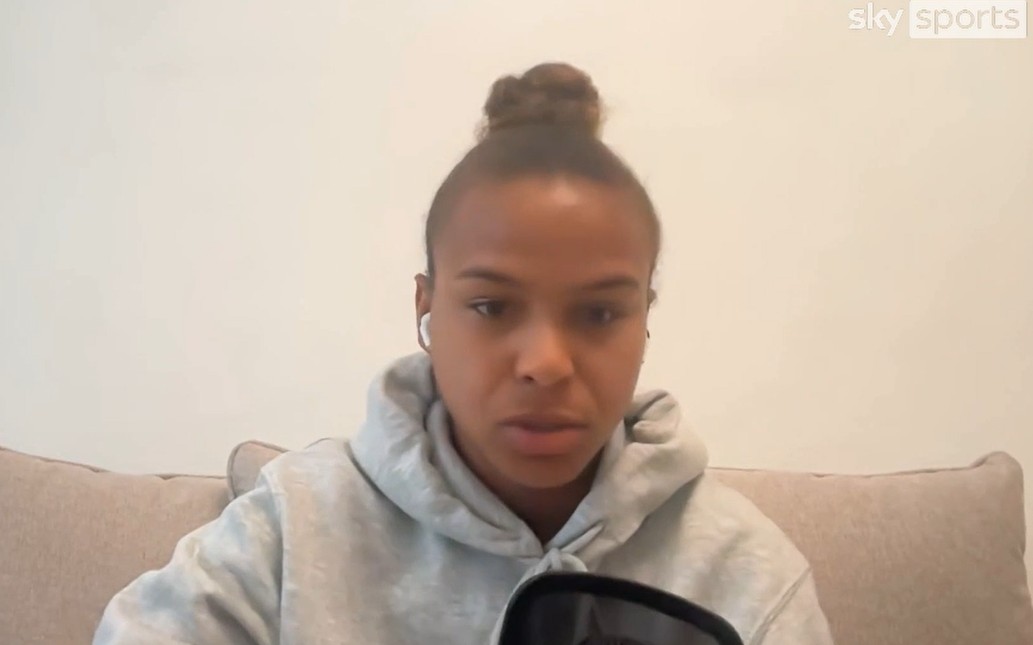
London City Lionesses forward Nikita Parris insists that taking the knee has ‘lost its sentiment’ as an anti-racism gesture.
Taking a knee as an anti-racism gesture first gained recognition in 2016 when NFL player Colin Kaepernick knelt during the US national anthem. The gesture was first prominently seen in English football during the 2020-21 season.
With October marking Black History Month in the UK, the WSL invited clubs to take the knee ‘as a symbol of solidarity against racism and discrimination’.
Players from both sides took the knee in the matches between London City Lionesses and Liverpool, as well as Leicester City vs Everton.
Brighton took the knee before their clash with Tottenham. Spurs players decided not to take part due to the racist abuse Jessica Naz suffered on social media last month.
The other three WSL games instead saw players from both sides come together in the centre circle and link arms. Those matches included Manchester United vs Chelsea, Manchester City vs Arsenal and West Ham vs Aston Villa.
Nikita Parris reacts to WSL clubs not taking the knee
Nikita Parris was part of the London City Lionesses squad that took the knee before their match with Liverpool.
However, Parris does agree with those who think that taking the knee no longer feels meaningful.
Speaking on the Pitch to Pod as per Sky Sports, she said: “I think taking the knee has lost its sentiment in terms of we did it so consistently over a long period of time that do people recognise, and do people relate to it?
“What was more powerful for me was when Arsenal and Manchester City were in the centre circle linking arms, showing togetherness and unity.
“This is two teams about to go and play each other, so already the competitiveness is there. But it is the significance of putting aside competition, putting aside the emotion of the game that is yet to happen.
“I think it’s really prevalent in football and society. Football is a sport that represents society because so many people relate to football in so many ways and it should be a place where people feel safe and valued.”
Recent cases of racism in football
During Euro 2025, Jess Carter suffered racist abuse on social media during the tournament in Switzerland.
Carter took a step back from social media after experiencing ‘a lot of racial abuse’ during the tournament. This led to England players deciding to stop taking the knee at the tournament which they went on to win.
Parris said that the racist abuse that Carter suffered was ‘not acceptable’ and that players felt scared that they would miss a penalty because of the abuse that could have been thrown at them if they missed their spot-kick.
Parris said: “It’s not acceptable (racism) and we’ve seen Jess Carter at the Euros, she came out she was strong.
The Club is disgusted by the racist abuse received by Jessica Naz via social media.
Jess has spoken out against this disgraceful behaviour – and we stand by her in calling out this unacceptable and cowardly act.
We are working with the appropriate authorities and social media… pic.twitter.com/KNRcRBF6jY
— Tottenham Hotspur Women (@SpursWomen) September 24, 2025
“You saw the reaction of other players from within the team, scared in case they were the only player to take a penalty and miss. Imagine going on the pitch and being scared to do something because of the repercussions that might come.
“Come on we have to change society, this is not good enough.”
Spurs and England forward Naz said she was ‘done being quiet’ after receiving racial abuse on social media last month.
After their League Cup win over Aston Villa, she said: “I was going to wait till after the game to speak because I’m done being quiet. I was subjected to racial abuse in my DMs.
“Racism in any form is unacceptable and is important to address this behaviour and ensure that steps are taken to prevent it from happening again.”
In the men’s game, both Antoine Semenyo of Bournemouth and Mathys Tel of Tottenham have suffered racist abuse since the start of the domestic season.




